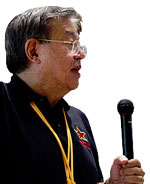The GNSO's Kristina Rosette has
submitted a motion to approve the recommendations in the Final Report on Proposals for Improvements to the Registrar Accreditation Agreement.
The text of the motion (minus all the whereas language):
RESOLVED, that the GNSO Council appreciates the effort of the Joint GNSO/ALAC RAA Drafting Team in developing the recommendations and proposals delineated in the Final Report for improvements to the RAA;
RESOLVED FURTHER, that the GNSO Council hereby accepts the Final Report and approves of the Form of the Registrant Rights and Responsibilities Charter as described in Annex D of the Final Report;
RESOLVED FURTHER, that the GNSO Council recommends that Staff commence the consultation process with Registrars in the RAA to finalize the Registrant Rights and Responsibilities Charter for posting on the websites of Registrars as specified in Section 3.15 of the RAA;
RESOLVED FURTHER, that the GNSO Council recommends that Staff adopt the process specified as Process A in the Final Report to develop a new form of RAA with respect to the High and Medium Priority topics described in the Final Report.
Process A states:
"1. Prioritized list of topics goes to GNSO council (i.e., final form of this report). Staff and council review may filter out topics that fall under consensus policy.
2. Negotiations begin with negotiation group consisting of Staff, the Registrars (as a whole, not individually), and certain observers representing the interests of affected non-parties to the agreement.
3. During negotiations, if Staff and Registrars agree, parties may vote to hold discussion on specified topics in executive session (excluding observers), then reporting back to the full negotiation group re progress.
4. Negotiating group reports [to GNSO and ALAC, or to the public] periodically (such as monthly) on status and progress. Negotiating group is expected to make bracketed text, and/or agreed items, available for public comment and feedback.
5. Negotiating group reviews comments and continues negotiations and repeat step 4 as necessary.
6. Staff and Registrars, after consultation with observers, determine when full final draft of new RAA is ready to be posted for public comment.
7. GNSO Council reviews and considers public comments and votes on approval of the RAA. GNSO Supermajority Vote to be obtained in favor of the new form.
8. If Council approves, the new RAA goes to Board for approval.
9. If Council does not approve, goes back to negotiation team with appropriate feedback for reconsideration. Repeat from step 6."
RESOLVED FURTHER, that the GNSO Council recommends that this process be initiated by ICANN immediately.
















































